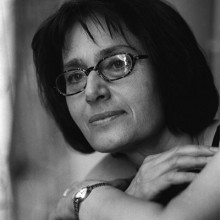Polish literature

Anna Bolecka
(born 1951) – author of fiction and essays, historian of literature.
Her first publication, issued in 1989, was a novel entitled Fly to Heaven, but her second book, The White Stone (1994), brought her wider acclaim. This novel is about the history of Bolecka’s own family, who lived for generations in the eastern borderlands of the pre-war Polish Republic. This lyrical journey into the distant past has an openly “therapeutic” element: the world of Great Grandfather (as the main hero is called) is a sort of lost paradise, a world characterised by order, harmony and beauty. The narrator sincerely envies her own ancestors for their simple and at the same time noble existence, their hopefulness, the delightful surroundings they happened to live in, the calm rhythms of their daily life and their close contact with nature. Anna Bolecka’s next novel, Dearest Franz (1999), has a rather different tone. The prototype for the eponymous hero was Franz Kafka, of course. The novel consists of fictional letters written by Franz and people in his social circle, especially the correspondence that the Prague recluse conducted with the women who were close to him. The special merit of this literary endeavour is that the author tactfully combines facts from Kafka’s personal biography with elements of the cultural (ethnic and moral) context. Bolecka takes particular care to examine the complex, not at all obvious connections between her hero and the Jewish milieu, and how Kafka was personally re-educated in that sphere. By following in the hero’s footsteps, the reader enters a realm of intriguing topics including Jewish mysticism, the mysteries of the Kabbalah, and the Yiddish theatre. Above all, the novel has a lot of old world charm and, like The White Stone, encourages us to spend time in a sort of “yesteryear”, and also lets us indulge in the classic style of the epistolary novel. Anna Bolecka has also written a successful children’s novel entitled Kites.
Anyone who looks deeper into this prose will discover some skilful interweaving of the symbols of earth, life and death, love and betrayal, being a stranger and having an identity. If he wants to, he will find a beautifully presented biblical motif of the sin-defiled love of Adam and Eve, with the devil-snake playing his part (…) I am not ashamed to heap praise on this book, because that’s what it deserves. It is a long time since I have read such pure faultless prose, which it is a real pleasure to read.
– Tadeusz Nyczek on The White Stone.
BIBLIOGRAPHY
- Leć do nieba (powieść), Warszawa: Iskry, 1989; wznow. Warszawa: Szpak, 1998.
- Biały kamień (powieść), Warszawa: Szpak, 1994; wznow. Gdańsk: słowo/obraz terytoria. 2001.
- Kochany Franz, Warszawa: Szpak, 1999.
- Latawce (powieść dla dzieci), Warszawa: Ezop, 2002.
- Concerto d'amore, Warszawa: W.A.B, 2004.
- Uwiedzeni, Warszawa: W.A.B, 2009.
- Cadyk i dziewczyna, Warszawa: Czarna Owca, 2012
TRANSLATIONS
danish:
- Som en sten fra himlen (Biały kamień), Valby: Borgens Forlag, 1998.
dutch:
- Een witte steen (Biały kamień), trans. Karol Lesman, Breda: De Geus, 1997.
- Lieve Franz (Kochany Franz), trans. Karol Lesman, Breda: De Geus, 2000.
french:
- Mon cher Franz (Kochany Franz), trans. Claude-Henry du Bord, Christophe Jezewski, Paris: S. Wespieser Éd., 2004.
german:
- Der weisse Stein (Biały kamień), Berlin: Berlin-Verlag, 1998.
- Lieber Franz (Kochany Franz), Frankfurt a. M.: Suhrkamp, 2000.
portugese:
- Querido Franz: um romance epistolar sobre Kafka (Kochany Franz), trans. Tomasz Barciński, Rio de Janeiro: Record, 2002.